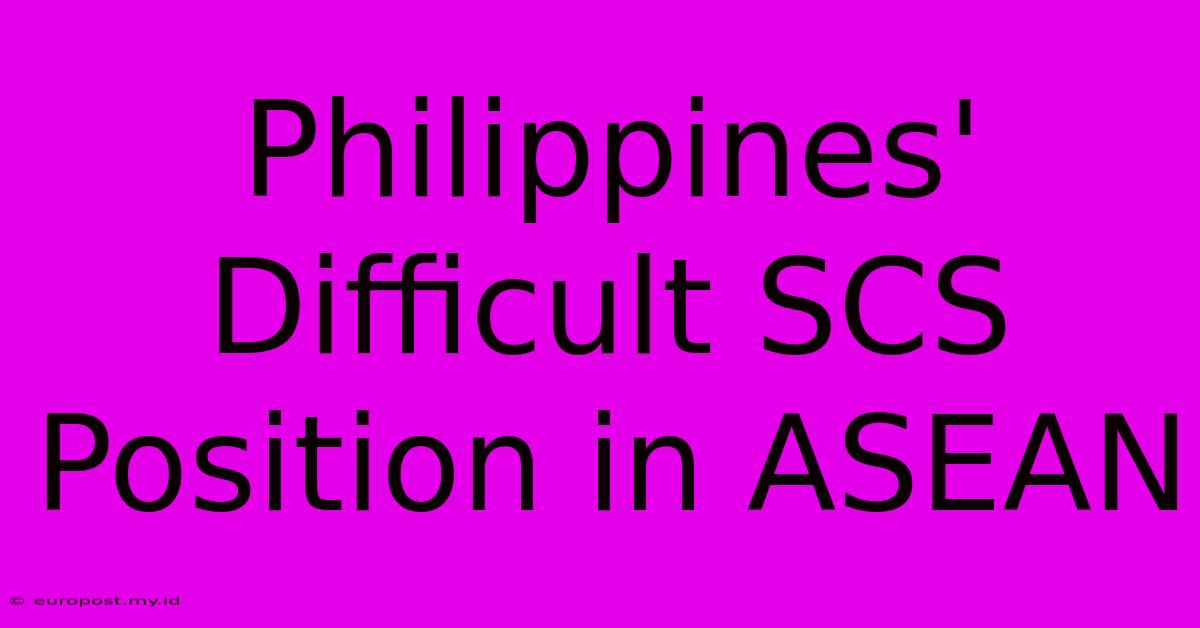Philippines' Difficult SCS Position In ASEAN

Discover more in-depth information on our site. Click the link below to dive deeper: Visit the Best Website meltwatermedia.ca. Make sure you don’t miss it!
Table of Contents
Philippines' Difficult SCS Position in ASEAN: Balancing Sovereignty and Regional Harmony
The South China Sea (SCS) dispute presents a significant challenge to the Philippines' position within the Association of Southeast Asian Nations (ASEAN). Straddling a delicate balance between asserting its sovereign rights and maintaining regional stability, the Philippines faces a complex geopolitical landscape. This article delves into the intricacies of this situation, examining the historical context, current challenges, and potential pathways forward for Manila.
Historical Context: A Legacy of Claims and Contests
The Philippines' claim in the SCS stems from its historical ties to the islands and its adherence to the UN Convention on the Law of the Sea (UNCLOS). However, these claims are contested by China, which asserts historical rights over a vast swathe of the SCS, encompassing areas crucial to the Philippines' exclusive economic zone (EEZ). This overlapping claim has led to numerous incidents, including the highly publicized Scarborough Shoal standoff in 2012, which significantly impacted the Philippines' fishing industry and its overall influence within the region. The 2016 arbitral ruling, which invalidated China's expansive nine-dash line claim, further complicated the situation. While a victory for the Philippines legally, the ruling has yet to be fully enforced, highlighting the limitations of international law in the face of great power politics.
The Impact of the 2016 Arbitral Ruling
The 2016 Permanent Court of Arbitration ruling, which favored the Philippines, was a landmark legal victory. It affirmed the Philippines' sovereign rights over its EEZ and invalidated China's expansive claims. However, China refused to recognize the ruling, emphasizing the limitations of international law in resolving disputes involving a powerful state. This disregard for international legal processes continues to cast a shadow on the region's stability and underscores the difficulties faced by the Philippines in asserting its rights.
Current Challenges: Navigating a Complex Geopolitical Landscape
The Philippines currently faces several key challenges:
-
China's assertive actions: China's continued militarization of artificial islands, harassment of Filipino fishermen, and disregard for the arbitral ruling pose significant threats to the Philippines' sovereignty and its access to crucial resources within its EEZ.
-
Balancing ASEAN unity and national interests: The ASEAN framework emphasizes consensus-based decision-making, which can be challenging when dealing with a powerful member state like China that often prioritizes its own interests. The Philippines must navigate this delicate balance, advocating for its rights without jeopardizing regional stability or alienating other ASEAN members.
-
Maintaining strong alliances: The Philippines' reliance on its allies, particularly the United States, for military and diplomatic support is crucial in countering China's assertive behavior. However, this relationship must be carefully managed to avoid further escalating tensions in the region.
The Role of External Actors
The involvement of external powers, particularly the United States, complicates the situation further. While US support is crucial for the Philippines, it also risks drawing the region deeper into great power competition. Finding a balance between securing support and avoiding further escalation remains a critical task for the Philippines.
Potential Pathways Forward: Strategies for the Philippines
The Philippines requires a multifaceted approach to navigate this complex situation. This includes:
-
Strengthening diplomatic efforts: Engaging in continued dialogue with China, while simultaneously seeking regional support through ASEAN and other multilateral forums, is essential.
-
Boosting maritime capabilities: Investing in its coast guard and navy strengthens the Philippines' capacity to protect its EEZ and deter further incursions.
-
Forging stronger alliances: Maintaining close ties with its allies, including the US, Japan, Australia, and others, provides crucial support for its defense and diplomatic efforts.
-
Promoting regional cooperation: Emphasizing cooperation on areas of mutual interest, such as fisheries management and environmental protection, can foster a more conducive atmosphere for dialogue and dispute resolution.
Conclusion: A Long-Term Strategy is Crucial
The Philippines' position in the SCS is a complex and enduring challenge. There is no quick solution, and the country requires a long-term strategy that combines diplomatic engagement, strengthened military capabilities, and strategic alliances. The success of this strategy will depend on the Philippines' ability to skillfully balance its national interests with the need for regional harmony within ASEAN, while simultaneously navigating the complexities of great power competition. The future of the SCS, and the Philippines' place within it, hinges on its capacity to adapt and strategically navigate this difficult but critical geopolitical terrain.

Thank you for taking the time to explore our website Philippines' Difficult SCS Position In ASEAN. We hope you find the information useful. Feel free to contact us for any questions, and don’t forget to bookmark us for future visits!
We truly appreciate your visit to explore more about Philippines' Difficult SCS Position In ASEAN. Let us know if you need further assistance. Be sure to bookmark this site and visit us again soon!
Featured Posts
-
2024 Nba Cup Warriors Vs Grizzlies Betting Odds
Nov 16, 2024
-
Nayantharas Open Letter Defining Character
Nov 16, 2024
-
Copyright Clash Nayanthara And Naanum Rowdy
Nov 16, 2024
-
Nayanthara Dhanush In Naanum Rowdy Dispute
Nov 16, 2024
-
Steph Currys Impact Warriors Vs Grizzlies
Nov 16, 2024
